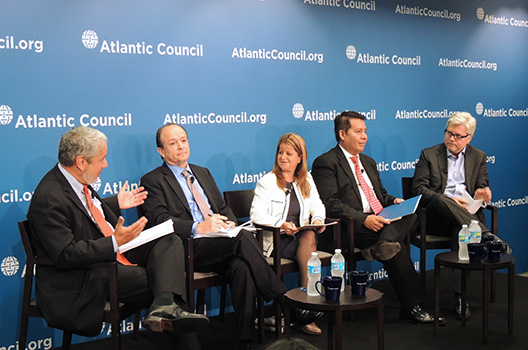 Just days after the Colombian President Juan Manuel Santos announced a dramatic breakthrough in the country’s Peace Process, The Adrienne Arhst Latin American Center hosted an event featuring an expert panel to discuss the future of Colombia. Ending the 50 year conflict between the government and the Revolutionary Armed Forces of Colombia (FARC) is met with numerous challenges, not only towards finalizing this ambitious agreement but also in planning for a successful post-conflict period. The upcoming regional elections on October 25, 2015, will be of crucial importance in determining the future of Colombia, as newly elected mayors and governors will become key players in achieving lasting and sustainable peace. Given the advances in the negotiations and the prospects for strong regional governance, Colombia’s future is looking brighter than ever.
Just days after the Colombian President Juan Manuel Santos announced a dramatic breakthrough in the country’s Peace Process, The Adrienne Arhst Latin American Center hosted an event featuring an expert panel to discuss the future of Colombia. Ending the 50 year conflict between the government and the Revolutionary Armed Forces of Colombia (FARC) is met with numerous challenges, not only towards finalizing this ambitious agreement but also in planning for a successful post-conflict period. The upcoming regional elections on October 25, 2015, will be of crucial importance in determining the future of Colombia, as newly elected mayors and governors will become key players in achieving lasting and sustainable peace. Given the advances in the negotiations and the prospects for strong regional governance, Colombia’s future is looking brighter than ever.
After an introduction by Jason Marczak, Deputy Director of the Adrienne Arsht Latin America Center, the event began with words from His Excellency Juan Carlos Pinzón, Ambassador of Colombia to the United States. Ambassador Pinzon highlighted the country’s significant social progress and economic growth thus far, and commented on his hopeful vision for the future. His Excellency indicated that “to further move our economy and people forward on the path to prosperity, we must continue to strengthen the middle class, provide more job opportunities, attract investment, and boost commercial ties to trade initiatives like the Pacific Alliance”.
Following the Ambassador’s remarks, the conversation began with a keynote by Elsa Noguera, the first female Mayor of Barranquilla. Noguera’s cheery remarks about Barranquilla’s transformation from bankruptcy to one of the most thriving cities in Colombia, provided an optimistic model for other regions and embodied the so-called Colombian Miracle. In regards to the peace process, Mayor Noguera noted that although it is not yet a done deal, last week’s meeting in Havana is an important advancement. “There is much left to be done,” Noguera noted, for instance: “the atrocious crimes and violations of human rights must be sanctioned. There’s nothing that creates more insecurity and violence than impunity.”
The Director of the Adrienne Arsht Latin America Center, Peter Schechter, shared his keen affection for Colombia as he facilitated the discussion between the event’s panelists and engaged with members of the audience. Commenting from the economic spectrum, Joaquin Cottani, Chief Economist for Latin America at Standard and Poor’s, explained that although Latin American is the region with the most inequality in the world, Colombia’s ability to enact economic policies for the better makes it one the strongest countries in terms of overcoming challenges.
The panelists also discussed Colombia’s economic presence in the region, from its membership in the Pacific Alliance, to the current process of joining the Organization for Economic Co-operation and Development (OECD), and possible inclusion in the Trans-Pacific Partnership. The Head of Center for Latin America and Mexico at the OECD, Roberto Martinez, stated that Colombian authorities must prove its commitment to a set of key policies and alignment of standards to join the “Club of best practices”.
Miguel Silva, nonresident Senior Colombia Fellow at the Adrienne Arsht Latin America Center, and author of the Center’s forthcoming report on Colombia, shared his views on the peace process. Silva believes that agreement on transitional justice is of utmost importance; including the need for the guerrillas to confess. The event concluded with closing remarks by Neil Herrington, the Executive Director of the Americas at the US Chamber of Commerce.
